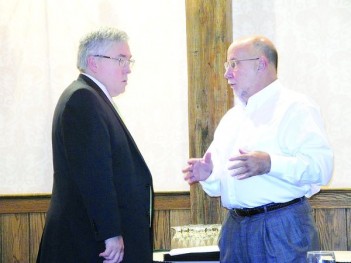
West Virginia Attorney General Patrick Morrisey, left, speaks with Corky DeMarco, president of the West Virginia Oil and Natural Gas Association, during the group’s meeting Thursday in Wheeling.
WHEELING, W.Va. — While many people believe new policies making it more difficult to burn coal will augment natural gas’ role in powering the nation, West Virginia Attorney General Patrick Morrisey believes it’s only a matter of time before that industry finds itself in the regulatory crosshairs, too.
“You’ll be next up on the dinner table if this administration succeeds in doing what it wants to do to coal,” Morrisey told members of the West Virginia Oil and Natural Gas Association on Thursday during the group’s fall meeting at Oglebay Park.
Morrisey, who is West Virginia’s first Republican attorney general since 1933, said one of his priorities since he took office in 2013 has been trying to ensure the power of the U.S. Environmental Protection Agency doesn’t go unchecked. Most recently, he filed a lawsuit against the EPA seeking to overturn the agency’s new regulations on carbon emissions from fossil-fuel fired power plants.
“My instinct is that the Obama administration and its allies want to drive a stake through the heart of coal before it moves on to oil and gas,” Morrisey said. “But there are already signs that oil and natural gas are already in their sights.”
He pointed to the proposed Waters of the United States rule, which some, despite EPA assertions to the contrary, believe will allow the agency to regulate bodies of water as small as ditches. If that turns out to be the case, Morrisey said, the increased burden on the gas industry to obtain permits could greatly slow economic development.
The House of Representatives passed a bill this week that would stop the rule from taking effect, but its prospects are questionable in the Democrat-controlled Senate.
Morrisey said some have questioned his office taking such an active role in what many see as a political battle. But he said it’s well within his duties to act when he believes a federal agency is acting outside the scope of the law, particularly in a manner that harms West Virginia’s economy.
Clean water and air must be a priority, but clear roles need to be carved out for states and the federal government to achieve those goals, Morrisey said. He pointed out that 11 other state attorneys general have joined onto West Virginia’s lawsuit against the EPA.
“There’s a growing consensus that the EPA has thoroughly misinterpreted provisions of the Clean Air Act and the Clean Water Act. … Our job is to make sure that we enforce the rule of law,” Morrisey said.
The central argument of West Virginia’s lawsuit against the EPA is that the agency is seeking to regulate an emissions source – power plants – on a state-by-state basis even though they’re already subject to national standards. Such double-regulation, Morrisey said, is expressly prohibited by the Clean Air Act.
The suit is before the D.C. Circuit Court of Appeals, which includes seven judges appointed by Democrat presidents and four by Republican presidents. Morrisey said he’s confident of victory, though he knows there are no guarantees in the court system.
“We’re right on the law,” Morrisey said. “That doesn’t mean you always win, but we’re going to put the effort in.”
The scope of the regulations being advanced and their potential impact, Morrisey believes, calls for the legislative branch to play a greater role.
“Let Congress decide that,” he said. “This is not a job for unelected bureaucrats.”
To read more from The Intelligencer/Wheeling News-Register, subscribe here.





